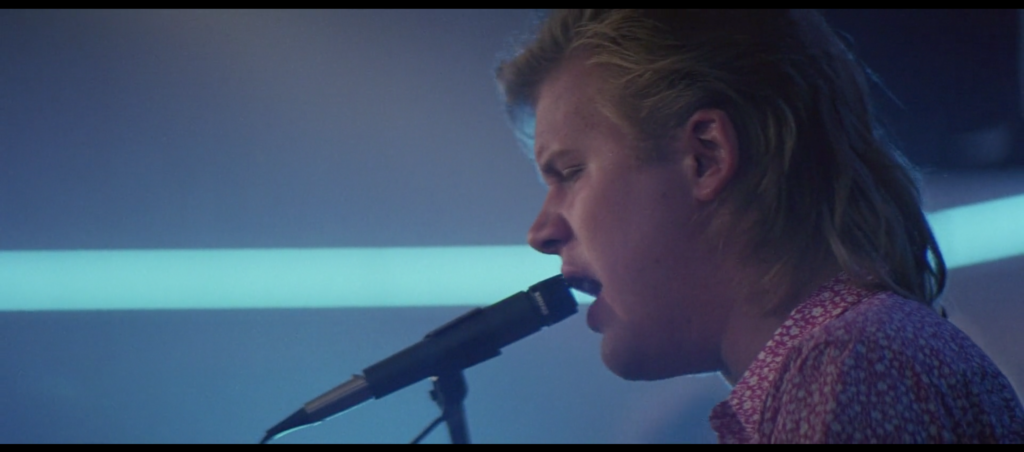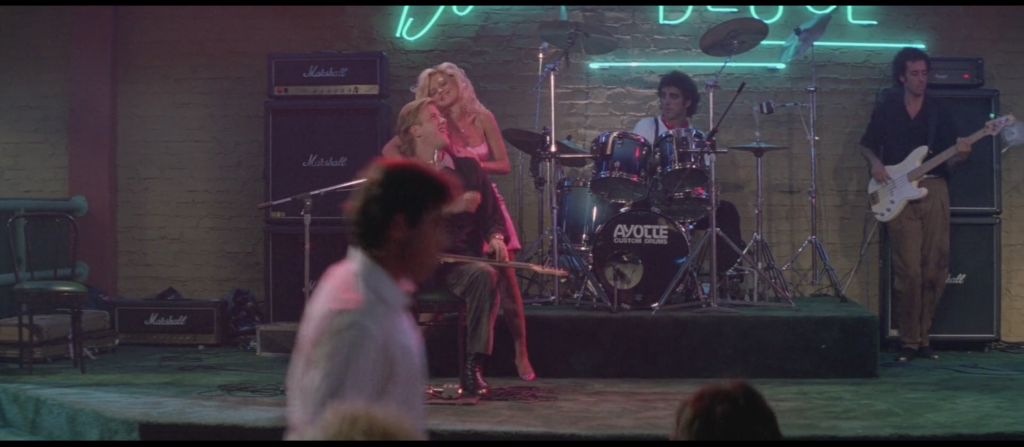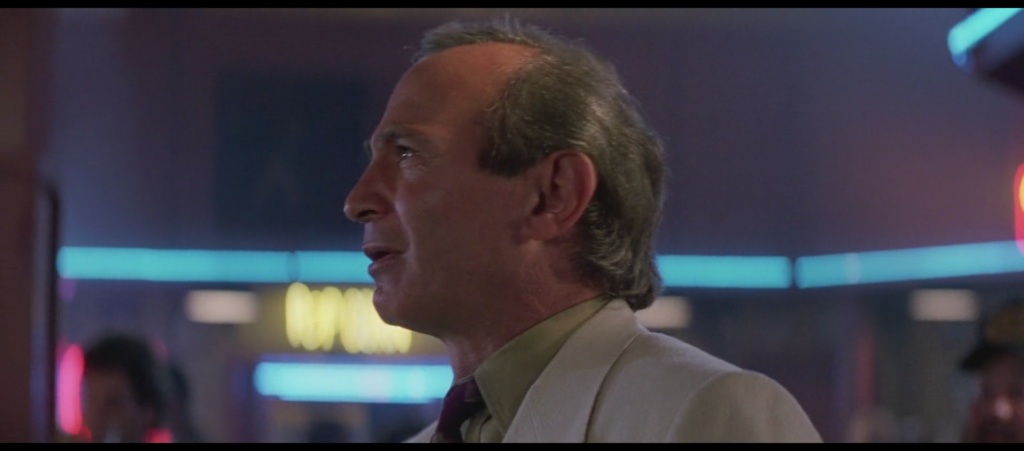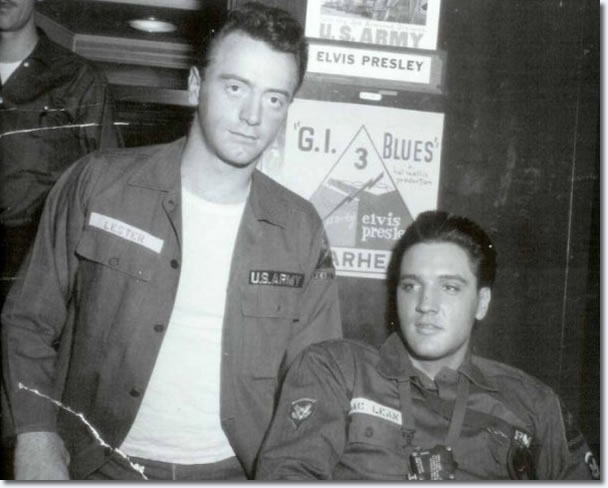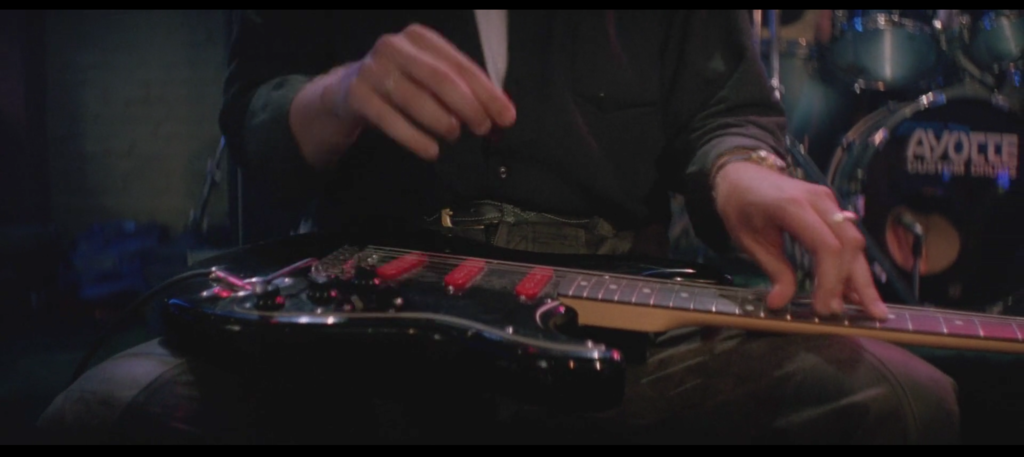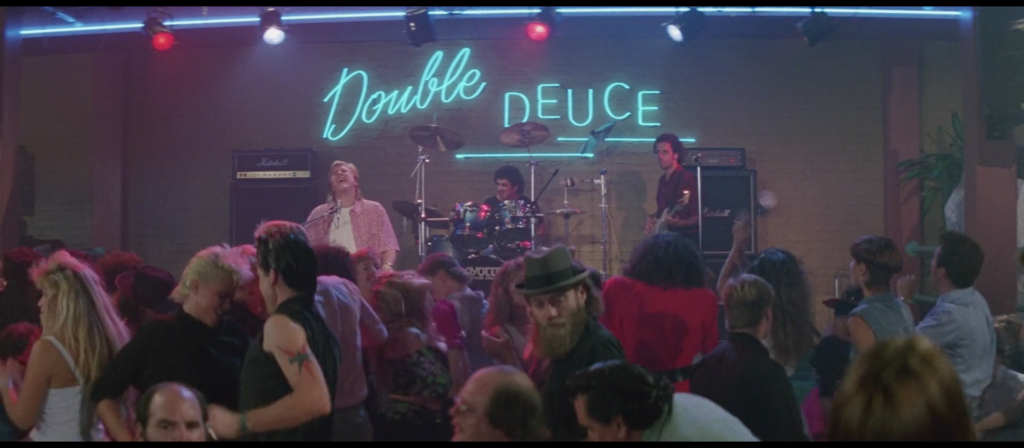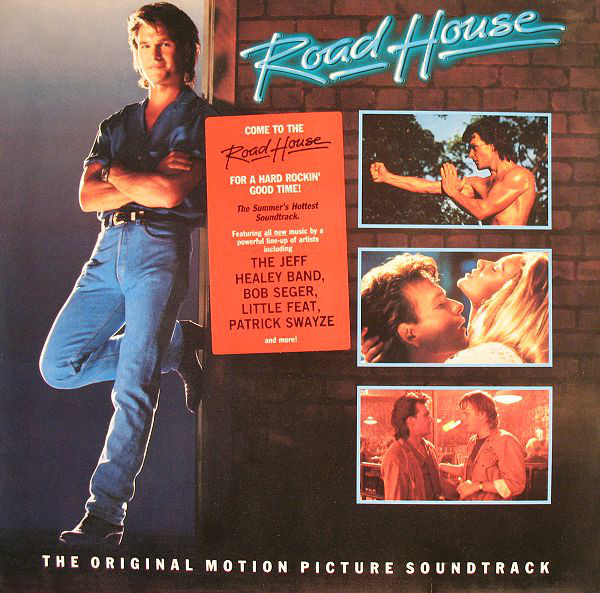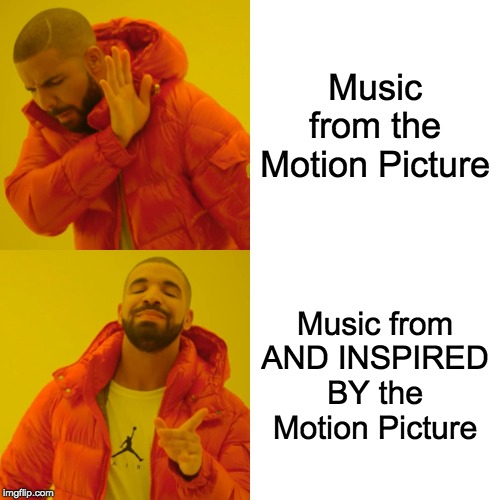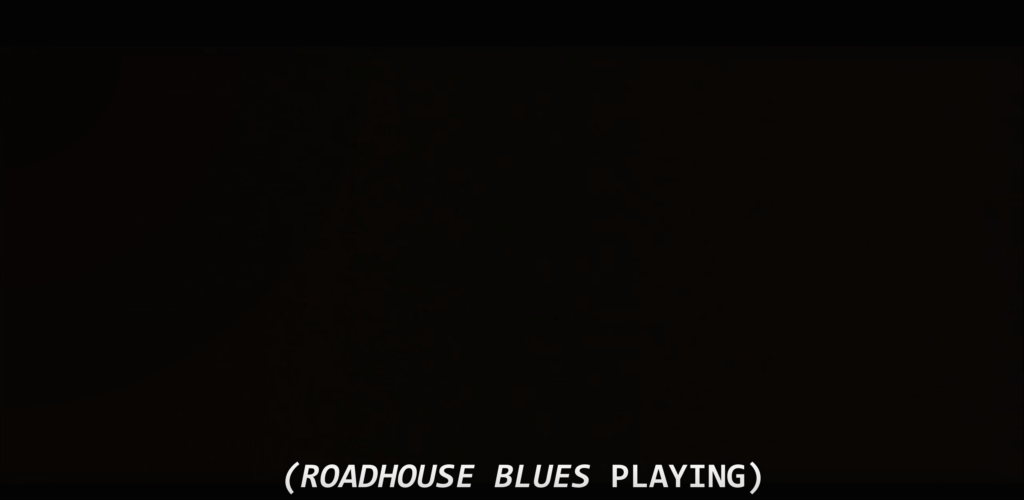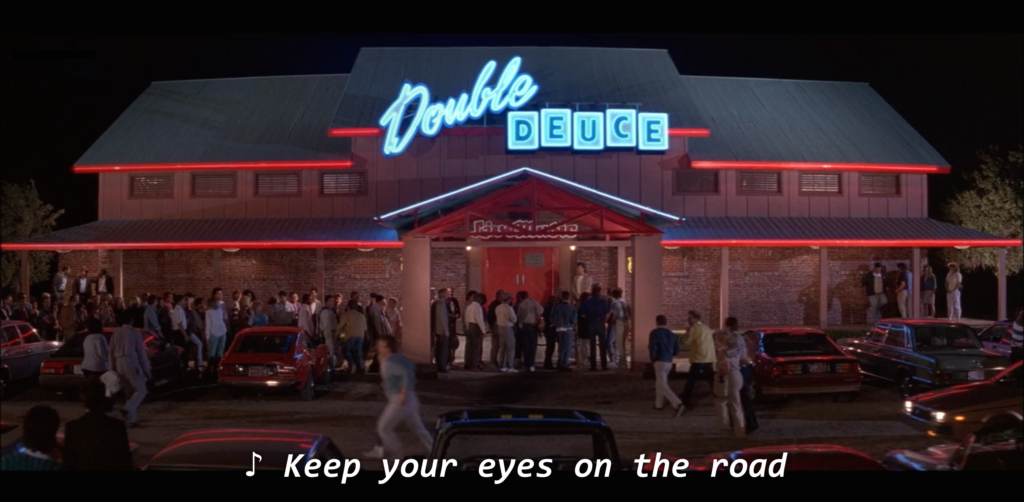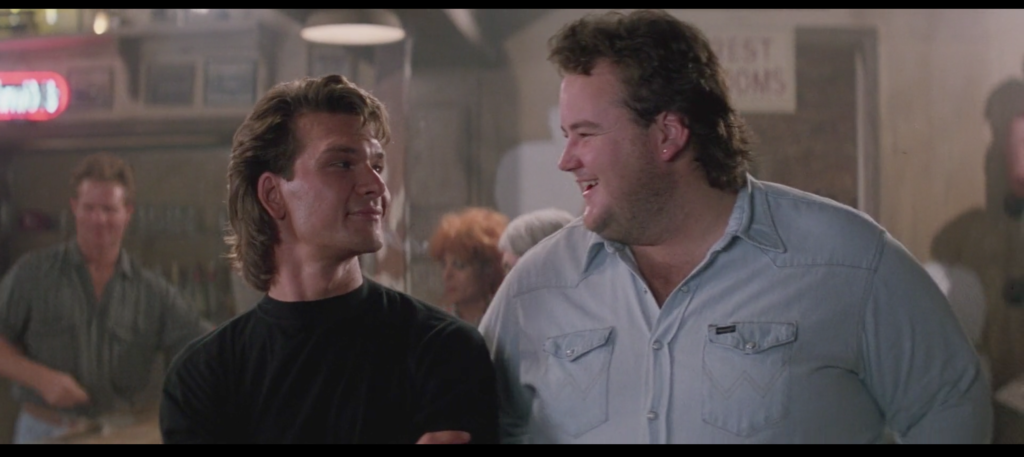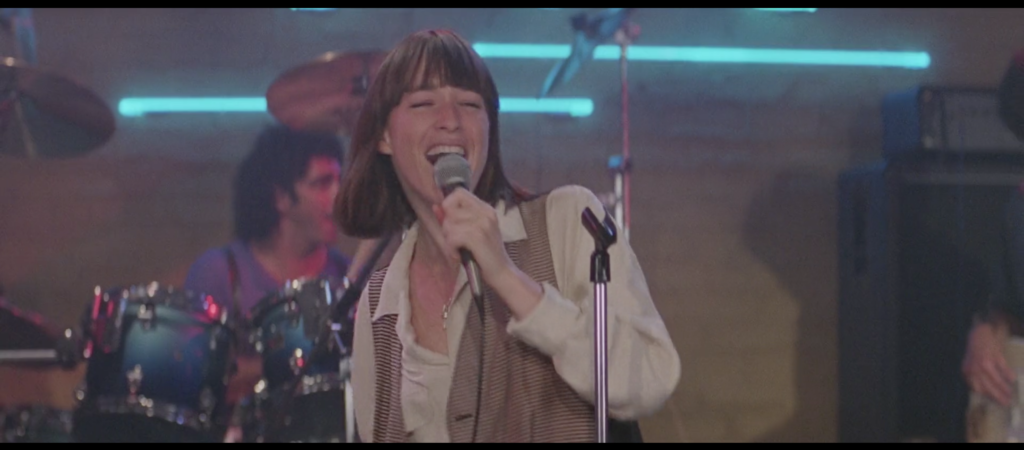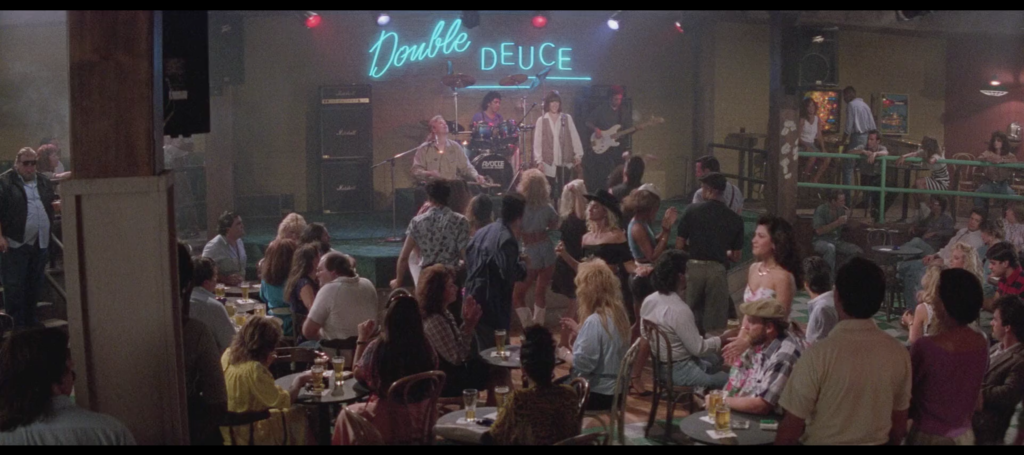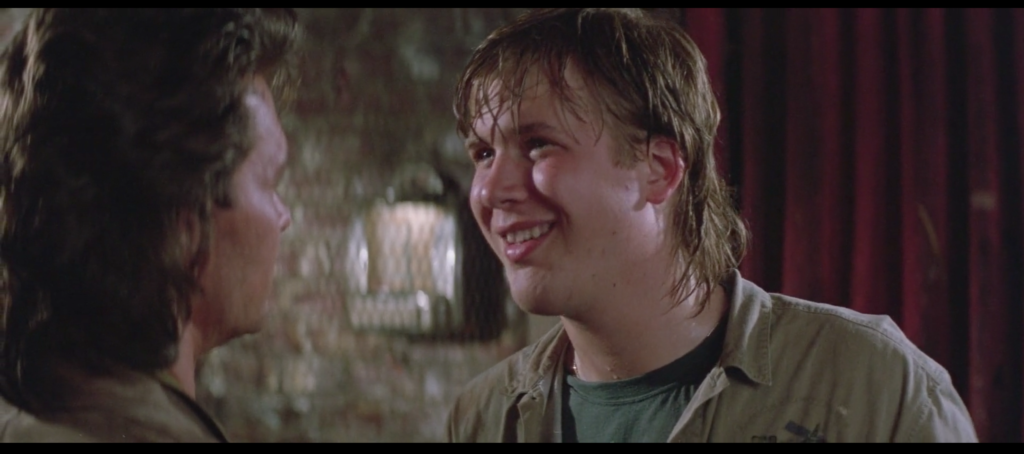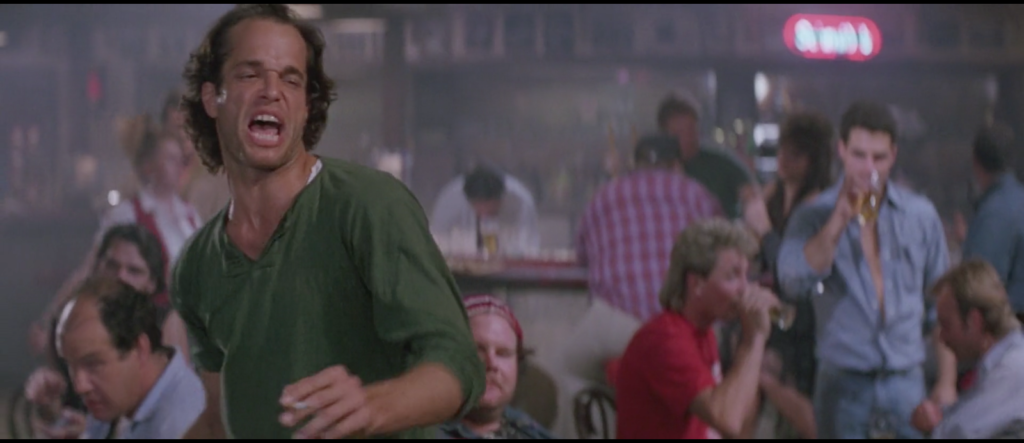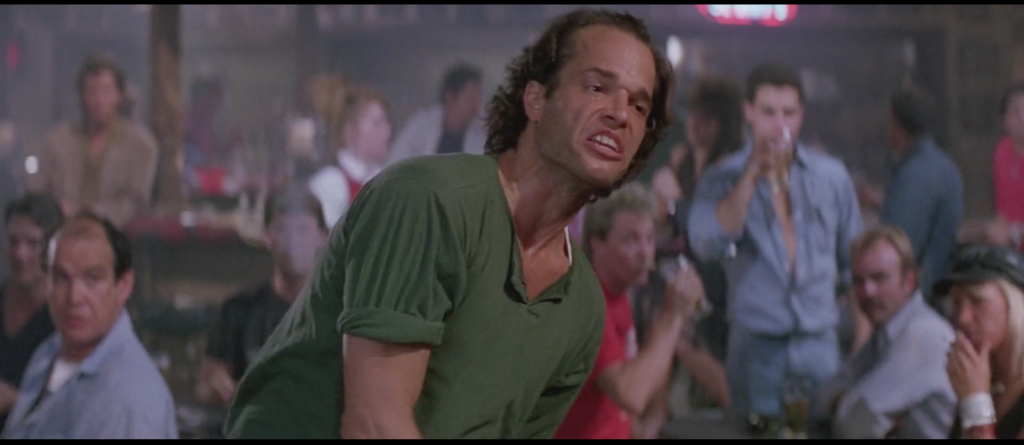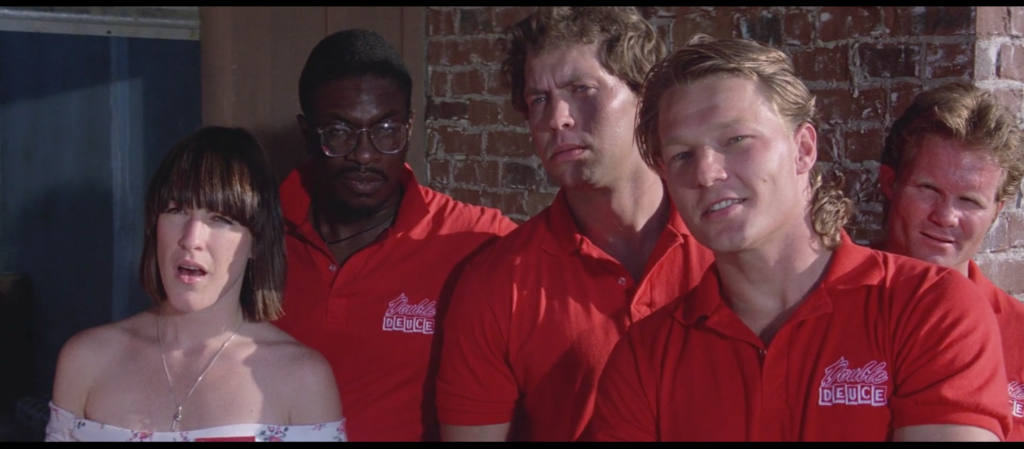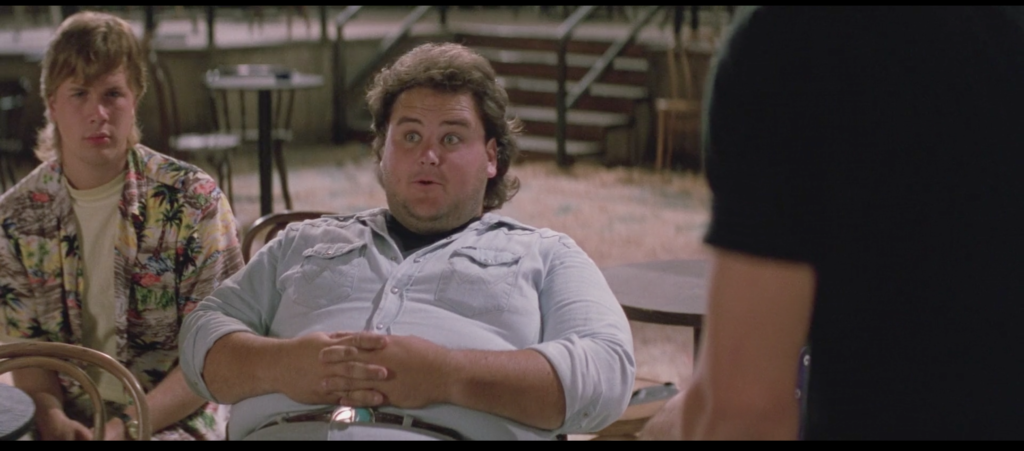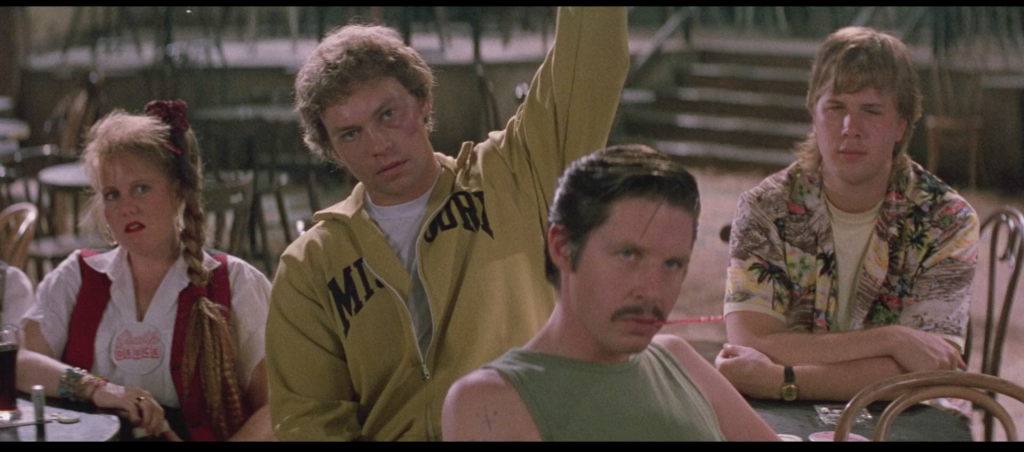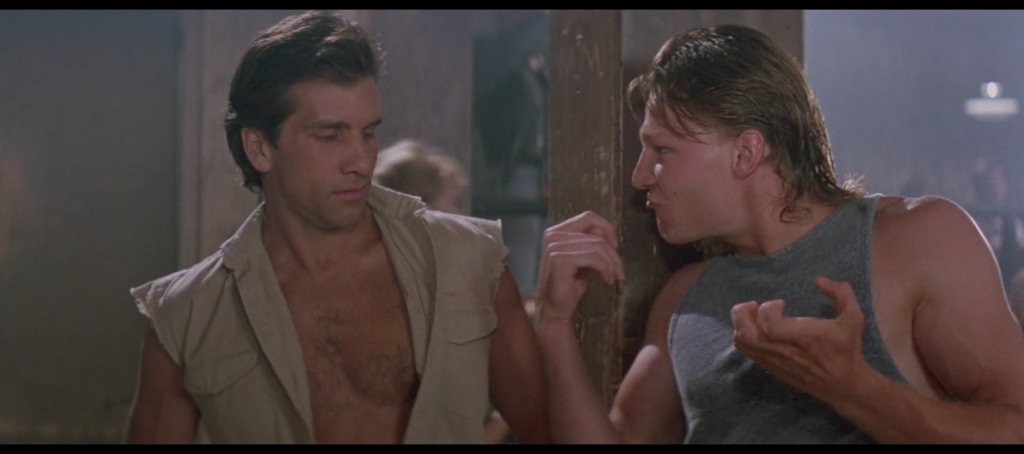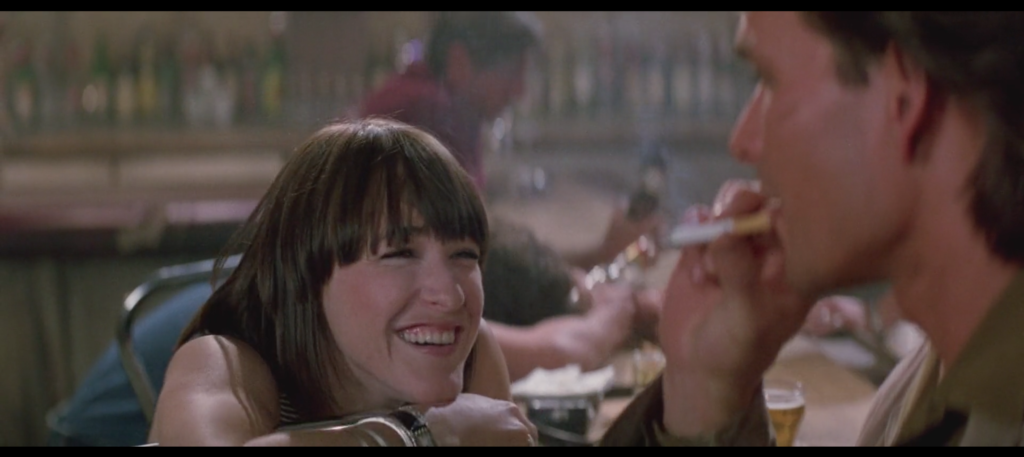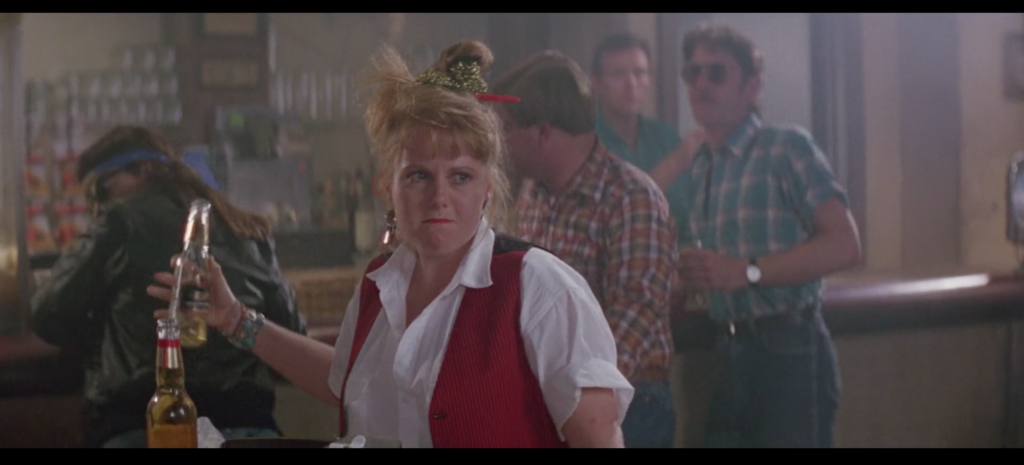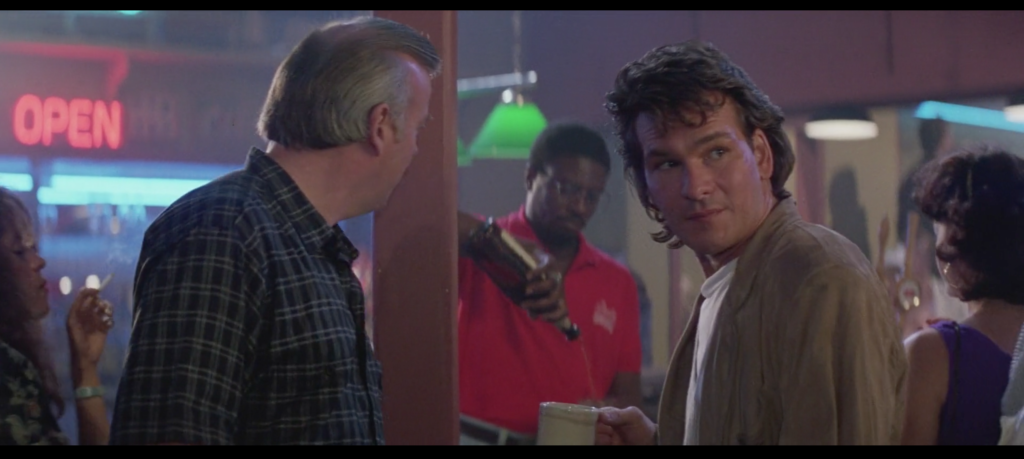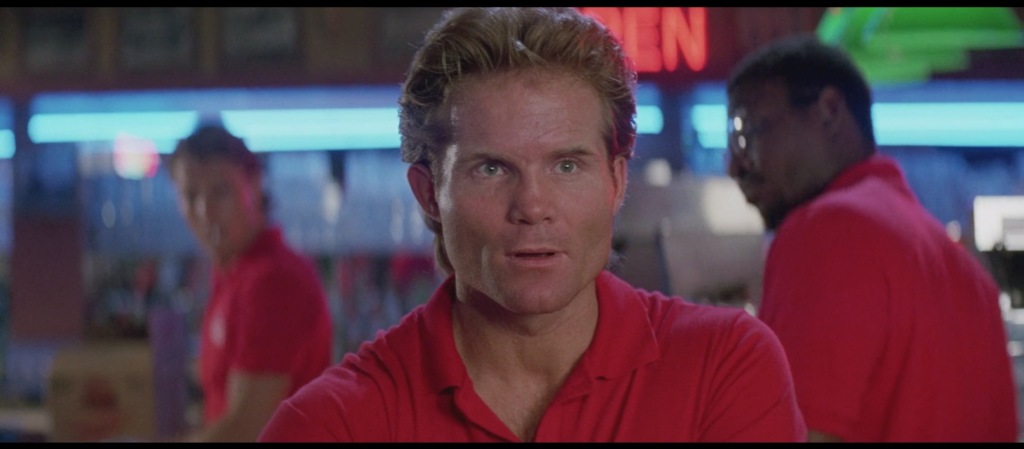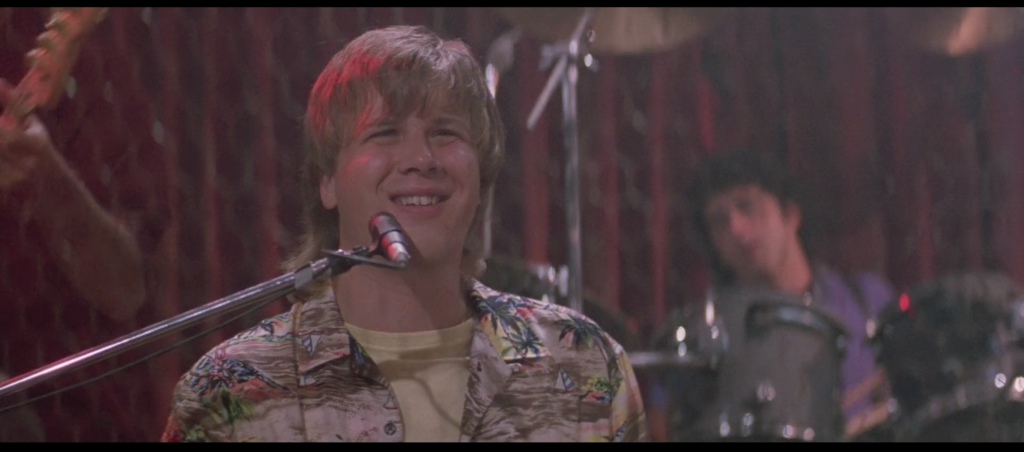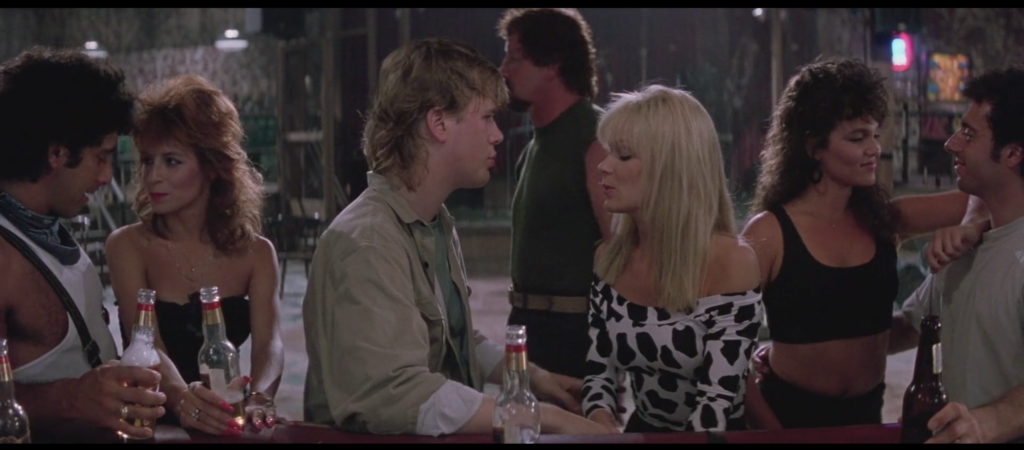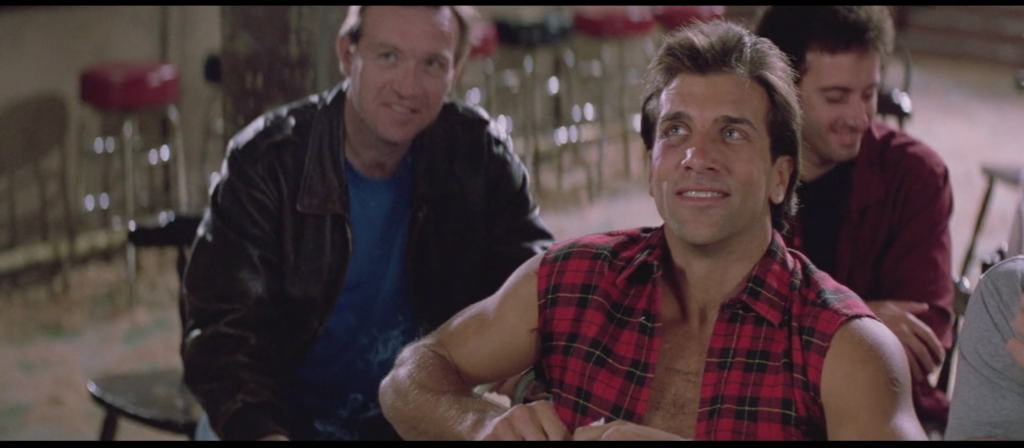Posts Tagged ‘the jeff healey band’
355. “When the Night Comes Falling from the Sky”
December 21, 2019Road House ends to the tune of “When the Night Comes Falling from the Sky,” the Jeff Healey Band’s cover of a song from Bob Dylan’s 1985 album Empire Burlesque. As you might expect, Healey peels the song away from the sound of the Big 80s Arthur Baker–produced original and moves it comfortably back into the bar rock sound Dylan favored when playing the song live with Tom Petty & the Heartbreakers as his backup band. Healey’s version is a bit less hard-charging though. It takes you more slowly and steadily through the song, which exists in Dylan’s “talking about romance with the voice of a prophet of doom” mode. In point of fact its structure and sound are close enough to “All Along the Watchtower,” especially in Healey’s version, that Dylan could have wound up with one of a hideous “self-plagiarism” lawsuit, John Fogerty–style, if things had worked out differently than they did.
Fortunately that never happened, and we can consider the song on the merits. It’s a minor-key track, kind of a down note to end the movie on, especially so soon after the whole “a polar bear fell on me” thing. But it’s a smokin’ performance by Healey—and, more importantly, a fitting sendoff for the romance of Dalton and Doc, two people who are going to have to learn to accept one another for who they are if their relationship is to survive.
Dylan/Healey sing of returning from a journey of hundreds of miles at the end of a chase. They hint at past traumas, narrowly escaped disasters. They say they’ve got no easy answers and shouldn’t be expected to lie to make up for that. They talk of protecting someone, and of not asking one another to do something they’re not ready to do. They sing of finding one another “in the wasteland of your mind.” As a reflection on the final days of the film, the period that stretches from the fire at Red’s to the shootout in the trophy room, I think it displays the emotional stakes for our two lovers quite well. Can true love emerge from the tumult? We’ll find out…
250. Whose side are you on?
September 7, 2019There’s something a bit unnerving about the alacrity with which Cody and the boys acquiesce to Brad Wesley’s command that they “play something with balls.” Surely one of Dalton’s oldest and dearest friends could be counted upon to reject the orders of the man’s nemesis, even if the end result of following orders is a beautiful woman taking her clothes off to the rhythm of “Hoochie Coochie Man,” right? But no, there they are, rocking out with their proverbial cocks out, smiling and seeming to enjoy every minute of their shared performance. True, Cody can’t see what Denise is doing, but from the hoots and hollers of the audience it doesn’t take Hercule Poirot to deduce what’s happening up there on the stage. Cody even gets a happy little caress out of the deal for himself, as you can see above. Is it as simple as “the show must go on”? Does Cody have an ulterior motive? Are he and his curly-haired compatriots simply being Horny On Main? I don’t have an answer to this one, I’m afraid. Perhaps that’s just one of the ways in which this scene signals the start of the Bad Times to come.
247. “Play something, Elvis!” or wheels within wheels
September 4, 2019“It’s like a morgue in here,” observes Brad Wesley of the mood in the Double Deuce. When you blow up a local business it’s hard to blame the locals for failing to be festive, but that’s Brad Wesley for you, a man who muscles car dealers for protection money by day and throws shit-happens-when-you-party-naked moonlight swims for his goons by night. Hell, he swerves all over the road by day too, so in a sense the party never stops.
Thus, his command to the band: “Play something, Elvis!” He’s looking right at all three members of the Jeff Healey Band when he says this. You’d be hard pressed to line up three white men who resemble Elvis less, but one gets the sense that Brad Wesley has, as so many older men do, calcified ideas of what constitutes a good time in every respect, music included. A rock and roll singer? Elvis. An actor? I’m guessing John Wayne. I wouldn’t be surprised if Wesley’s entire pop-culture cosmology consists solely of people Public Enemy warned us about in “Fight the Power,” “the Power” excluded of course.
Just after his command, which goes unheeded for a few moments, Wesley makes another proclamation: He tells no one in particular to “Get those firemen in here—I want to buy them a drink!” Seems like the least he can do to pay them back for the arson.
But for Wesley, the blame rests squarely on the shoulders of the arsonee, not the arsoner. “Risking their lives for that no-good faggot draft dodger Red Webster” is how he describes the firefighters’ duty that grim night, opening up alllllll kinds of yeeesh-inducing questions about Wesley’s politics, none of which have happy answers. Note that Wesley’s subsequently expressed complaint about Red is that he doesn’t chip in to improve the town like everyone else; knuckling under to Brad Wesley’s protection scheme is the traditionally heterosexual thing to do, apparently.
Red, you’ll recall, moved to Jasper twenty years ago, because he got married to an ugly woman from the area and fell in love with the place even as she fell out of love with him. Actor Red West (yep) was born in 1936, and assuming Red Webster is the same age that would make him 32 or 33 years old in 1969 when the marriage took place—well past the age of conscription, even given that the marriage exemption had been lifted by LBJ some years prior. At any rate, Jasper, Missouri is not exactly Canada, and it seems unlikely that Red had connections who could make a bone-spur deferment materialize for him even if his number came up.
What about Korea, then? We know from Brad Wesley’s big breakfast monologue that he served in that hot Cold War conflict, and from that we could assume he’d take especial umbrage at anyone who managed to weasel out of the service. But Red would only have been in his mid-teens during the Korean War, again placing him out of range of the draft.
All that remains to us, then, is peacetime conscription in the interwar years. And who was the most famous draftee during that time period? A man named Elvis Presley.
And who was in Elvis’s entourage, very much in real life? His old high-school chum Red West. Who was drafted too—and appeared in G.I. Blues, a movie in which he and Elvis were soldiers.
Play something, Elvis. “Reveille,” perhaps.
238. White Room
August 26, 2019With the Memphis Monologue on one side (following hot on the heels of Wade Garrett’s area hair) and the destruction as if by napalm of Red Webster’s auto parts store on the other (followed immediately by Denise showing us the girls), it falls to Jeff Healey to provide us with a bridge commensurate to that level of emotional intensity and body heat. Boy, does he deliver. The Jeff Healey Band’s rendition of that perennial nightclub floor-filler “White Room” by Cream (just go with it) is an absolute barn-burner (no pun intended), featuring a solo by Healey that could peel paint off the walls. It makes Wade Garrett consider attempting to get hisself double-teamed by two lovely young ladies standing next to him and Dalton, as he indicates to his protégé with a knowing nod and wink. (Dalton shakes his head in that “oh you lovable scamp” fashion; don’t think for a second he’s tempted himself, since his virtue will be put to the test shortly.) I think it’s possible it’s actually what sets Red Webster’s place on fire. It whips ass, is what I’m saying, and the movie is lucky to have music of such self-evident force and badassery in its arsenal when no one’s around to get punched in the head.
195. Roadhouse Blues
July 14, 2019The Doors are good. They’re a good band, I’m sorry. Break On Through, Light My Fire, Touch Me, L.A. Woman, People Are Strange, Alabama Song, The End, Riders on the Storm, Love Me Two Times, Hello I Love You, Roadhouse Blues—guess what, that’s a good band! That’s more bangers in four years than Eric Clapton has across all of his projects in a decades-long career combined (for the record: Layla, Bell Bottom Blues, White Room, Tales of Brave Ulysses, Crossroads, Sunshine of Your Love, I Feel Free, Badge, While My Guitar Gently Weeps, Cocaine, and most of those were written by people not Eric Clapton), and I’m not even digging particularly deep. It’s not a Creedence Clearwater Revival’s contemporaneous California run of absolutely miraculous hitmaking, but it’s up there. The insistence that the Doors are a gigantic joke, a dorm-room poster posing as a band, a faux-poetic wet fart—it’s childish, tbh. It’s jejune. It’s “except rap and country,” it’s “Ringo was a bad drummer,” it’s a YouTube comment complaining that today’s music just can’t compare. It’s so, so freeing to leave it behind and fucking bellow YOU KNOW THAT IT WOULD BE UNTRUE! in that final verse as you sing along in the car or just shred BREAK ON THROUGH TO THE OTHER SIDE! at karaoke or whatever. Godfathers of goth along with the Velvet Underground as well. If the Doors were good enough for David Bowie, who loved them, they’re good enough for you too. We have Kiss and Bon Jovi and the Eagles (excepting the song Hotel California and the solo stuff) to kick around. Leave Mr. Mojo Risin’ alone!
I say all that to say this: The Jeff Healey Band really kill it on “Roadhouse Blues.” It’s the most natural fit possible for the movie (duh), for Healey’s more high-energy Stevie Ray Vaughn thing, and for a solo so hot you can all but smell smoke rising from the guitar he holds on his lap. It also loses the scat-singing portion of the song, which is probably one of the reasons you hate the Doors if you hate the Doors. They do it well enough that you could actually conceive of a full nightclub dancing to “Roadhouse Blues” by the Jeff Healey Band, and I mean dancing their asses off, or their gaucho hats, whichever comes first, which they do. LET IT ROLL, BABY, ROLL! LET IT ROLL….ALL NIGHT LONG!
190. Soundtrack
July 9, 2019The thing you need to know about Road House: The Original Motion Picture Soundtrack is that it’s not what you think, or perhaps even hope, it is. It’s not a wall-to-wall collection of all of the Jeff Healey Band’s performances from the film. Four of their songs make the cut, but one (“I’m Tore Down”) is only minimally memorable from the movie, and several of the big showstoppers (“Travellin’ Band,” “White Room,” “Knock on Wood (feat. Kathleen Wilhoite)” are nowhere to be found. There’s no snippets of the High Hollywood action-movie score by Michael Kamen, the late great film composer who counted the original Die Hard trilogy and Metallica’s orchestral album S&M among his achievements. “These Arms of Mine” by Otis Redding? That’s in there, thankfully. Alabama’s “(There’s A) Fire in the Night”? No joy.
What you get is a mixture. There’s those four Jeff Healey tracks, including “Roadhouse Blues” and “Hoochie-Coochie Man” from the Denise striptease and Bob Dylan’s self-plagiaristic “When the Night Comes Falling From the Sky.” Otis is on there. Most of the songs are covers—Dylan, the Doors, Willie Dixon, Willie Nile, Maria McKee by way of Feargal Sharkey, Fats Domino. There are at least four songs on here, including two performed (and one co-written) by Patrick Swayze himself, that I don’t think are in the actual movie at all.
You could complain about that, were you so inclined. Me, I’m happy to hear Patrick Swayze’s surprisingly high breathy singing voice over massive ’80s production tricks (giant drums, “ay-oh ay-oh” backing vocals, little glittery synth fills). And anyone who played Prince’s Batman album and Madonna’s Dick Tracy tie-in I’m Breathless as often as I did in middle school knows this much is true:
186. [whispering to date while watching Road House when Road House first appears on the screen]
July 5, 2019125. “I didn’t know she could sing!”
May 5, 2019If this configuration of Dalton and his padawan-learner Jack looks familiar, it’s because we’ve been here before. The exchange and fight scene that are about to occur are perhaps the purest distillation of the Dalton Path in the entire film, following the Three Simple Rules and their various chapters and verses to the letter. As a bonus they show the primacy and utility of Jack among the Double Deuce’s other bouncers. It is Jack, after all, to whom Dalton relays the Riddle of the Right Boot, counting on the younger man to solve it. When they move on the intruders who’ve come to the bar to murder a man by kicking him in the head with a boot-mounted knife on account of the fact that he fired a rich guy’s nephew, they move as one.
But how did they arrive at this point? By what strange magic were Dalton and Jack united at this moment? The magic…of rock.
Specifically Carrie Ann’s variant thereof. The big-grinned barmaid with the bangs has traditionally occupied a privileged position in Dalton’s orbit. It is she to whom he first entrusts the secret of his name. It is she who preaches his name to the other barfolk. It is she who is granted a glimpse of the ass.
Now that the Double Deuce has been cleaned up, it is she who takes the stage to demonstrate this fact to the viewer. Would any woman have been caught dead on the stage of the old Double Deuce, where the only thing separating you from the ravening hordes, whose attention is drawn to and focused on that stage in a way no other staffer or patron can claim, was a thin chickenwire line? To be honest, dead might be the only way a woman would get caught on that thing. Putting a blind guy up there strikes me as some kind of ADA violation as it is.
But now things are different. How different? Different enough that a server is up there singing her gorgeous, joyful heart out. (Kathleen Wilhoite is truly one of this movie’s MVPs; I have no doubt from the way she shakes and grooves and grins and at one point even puts her hand to her face like “holy shit I can’t believe this!” is a sign of completely sincere pleasure on the part of the actor herself.) A few weeks earlier she had to save all her vocal power for yelling “BASTARD!” at people she’d just brained with a beer bottle in a barfight. Now she’s singing Eddie Floyd with the Jeff Healey Band.
That’s why Jack drifts over to Dalton that night: Just to smile with delight and say “I didn’t know she could sing!” He’s so happy in that moment, so happy to see someone he thought he knew reveal a new and exciting side of herself, so happy to know that as a bouncer on the Dalton Path he helped make that happen. It’s his desire to share that happiness that puts him by Dalton’s side when Ketchum strides in, anonymous minions by his side, to try to kickstab Dalton in the skull. The right place at the right time, that time being “time to not be nice.”
Call it a coincidence if you want, or even synchronicity. I call it the ne plus ultra illustration of the Third Rule, and of how the obervance of that rule yields dividends none could predict. Be Nice, commands Dalton. So mote it be.
123. Chicken wireless
May 3, 2019Dalton purged the staff of the Double Deuce of its criminal element.
Dalton purged the crowd of the Double Deuce of its criminal element.
Dalton defeated the minions of Wesley in open combat.
Dalton liberated the small businessmen of Jasper, Missouri from the Jasper Improvement Society.
Dalton saved the life of yeoman rancher Emmett.
Dalton put the minions of Brad Wesley down like dogs, one by one.
Dalton lulled Brad Wesley into a false sense of victory that enabled the small businessmen of Jasper, Missouri to gun him down.
Dalton taught the bouncers of the Double Deuce to walk the Dalton Path.
Dalton taught Dr. Elizabeth Clay how to love again.
Dalton freed Jasper, Missouri from tyranny.
For these deeds we honor him.
For these deeds we celebrate him.
But through his efforts, Dalton also freed the Jeff Healey Band from the loose-hanging confines of their chicken-wire prison.
And it is for this deed that we dedicate our lives to his service.
So was it nice. So is it nice. So ever will be it nice.
In the name of the Dalton, the Jack, and the Holy Wade.
Amen. Amen. Amen.
—from the Most Meet and Worthy Charter of the Holy Jasper Empire, Forty-Fifth Post-Tilghman Schismatic Revision; So Decreed by the Ass-Mother of the Sisters of Carrie Ann and the Eternal High Priestess of the Elizabethan Order; So Ratified by the Intranuclear Auto Sales Consortium, the Swords of Tinker, the Swords of Denise, the Cody Navigators, and the Guild of the Valet Visible; Sworn by the Blood of the Bleeder, Jasper IX, AD 7201
104. I Thought You’d Be Bigger Vol. 2: Cody
April 14, 2019For a recurring joke, “I thought you’d be bigger” gets deployed with a pretty broad affect range. The first person we hear say this to Dalton is Frank Tilghman, whose delivery is difficult to characterize in any way but sexual. The second is Cody, lead singer of the Jeff Healey Band in the Road House Universe, and his delivery could not be further removed from his and Dalton’s mutual employer.
Dalton arrives at the Double Deuce, takes in the scenery, and discovers that the bar band are old friends. He sneaks up on the lead singer with the help of his identical and yet somehow not related bandmates, with a theatrical finger-to-the-lips Marian-Madam-Librarian “shhhh” gesture he shares with each. He hands Cody a towel to mop up the accumulated sweat and projectile beer on his face, for which Cody thanks him. “You play pretty good for a blind white boy,” Dalton says, beaming. Recognition dawns in Cody’s face. “Yeah, and I thought you’d be bigger,” he jokes, and the two embrace, laughing.
I’m gonna level with you: I love this moment. Why? Because it’s one of the only times in the film where Dalton is completely at ease. He’s been reunited with an old friend, a peer, not someone he has to impress, not someone he has to instruct, not someone who mentored him, not someone he needs to mentor. They know each other well, but as colleagues rather than sensei and student. They pass feverish gossip about old times and current times: “Man, this toilet is worse than the one we worked back in Dayton,” Cody says. He also mentions that he and “the boys” heard Dalton was headed to Jasper, presumably from Tilghman, although word among barfolk travels far and fast of course. Dalton therefore does not need to dazzle Cody, nor earn his respect. Cody’s been sitting on his barstool on stage, guitar in his lap, waiting to welcome Dalton with open arms. Anyone would be happy to step into that situation.
But most important of all is that this exchange is just that: an exchange. Dalton ribs Cody in a way he is, presumably, accustomed to being ribbed—that his chosen genre and evident skill are anomalous given his race and disability. Cody thinks this is funny to hear, which indicates he’s heard it a million times before. He uses “I thought you’d be bigger” as a riposte, indicating that these two have shared late-night “You know what people say to me all the time and totally drives me nuts?” conversations over Miller Genuine Draft when the patrons of that toilet in Dayton have long since retired for the evening.
The point I’m trying to make is this: While Tilghman’s “I thought you’d be bigger” is off-putting and invasive, Cody’s is familiar, friendly, and inviting. Eat your heart out, Snake Plissken and “I heard you were dead.” Patrick Swayze and Jeff Healey just took you to catchphrase school.
060. “Hey, you’re paid to play—play!”
March 1, 2019Here’s a singularly unpleasant chain of events. Wrapping up his latest white-blues scorcher, Cody, the lead singer of the Jeff Healey Band, announces he and the band will be taking a brief break because, quoting here, “gotta drain the main vein.” I go back and forth on this. Not on whether it’s an awful thing to say, because it is; even a film this aggressively stupid that line lands on first-timers like punch in the nose. But in a way I think it’s gutsy to introduce a character by having him use a grotesque euphemism for using his penis to urinate in his first spoken lines of dialogue. And at least it rhymes, unlike “I heard you got balls big enough to come in a dump truck” or “Does a hobbyhorse have a wooden dick” or “I sure ain’t gonna show you my dick” and probably a few other phallocentric howlers I’m forgetting. That’s no doubt one of his proficiencies as a bard.
Then this man—you remember this man, he’s Heckler, played by Charles Hawke, and he’s a non-voting observer nation in The Agreement—then this man says something less unpleasant to read but vastly worse to hear. “Hey, you’re paid to play—play!” he screech-slurs in a hideous Noo Yawk accent that’s practically Piscopovian in its cartoonishness. Rendered phonetically s it’s more like “HAY YA PAID TA PLAY PLAY!“, its dulcet outer-borough tones more than a bit anomalous in a film whose language is listed as “Yokel” on the cassette box.
With that he throws a bottle of beer, still half-full, at the chickenwire fencing surrounding the Double Deuce’s stage. The guy’s got a real cannon of a right hand apparently, because it shatters into a million pieces with a sound you might associate with dinner scenes in which a guest says something so shocking that the hostess drops her plate.
The reaction of Jeff Healey Band frontman Cody is inscrutable. Judging from the way he reaches his hand to his bottom lip and growls “Fuck!” I think we’re to take it that a piece of glass made it through the mesh and cut him on the face, but two data points would seem to dispute this. First, he’s not visibly injured in his ensuing conversation with Dalton, and Road House is pretty fastidious about making sure people bleed properly. Second and more puzzling is his reaction in the moment: He simultaneously snaps his head back and flops forward, as if completely poleaxed. Again, the bottle hit the chickenwire, not him.
The logical explanation is that Cody is a sort of “earth spirit” or personification of the Double Deuce, serving a function similar to that of Tom Bombadil vis a vis Middle-earth in J.R.R. Tolkien’s The Lord of the Rings, though with the additional characteristic of suffering when the place through which his existence is defined suffers. As an elemental of this sort he can be expected to react strongly to damage he senses through his metaneural network. However, at no other point does Cody display this type of symbiosis with the Double Deuce, not even in the cataclysmic brawl that takes place just a few minutes later, so this theory too needs reexamination.
So we turn back to the other participant in this pas de deux, Heckler. Heckler, who lurks on the margins of The Agreement, the dissolution of which nearly destroys the bar. Heckler, who throws a bottle with sufficient force to break it to pieces on a fence. Heckler, who can wound this troubadour with pure mental animus. It seems safe to conclude that he is a black magician, or even a demonic entity himself, warping the world around him with his corrosively evil presence. Witnessing the Coming of Dalton, he wisely chooses to depart rather than test his strength against a servant of the Secret Fire, leaving more ambitious or more foolhardy members of his infernal cohort to fight in his stead. Who knows how many such creatures Dalton has banished by his mere presence.
019. Staff
January 19, 2019Brad Wesley isn’t the only man in Jasper, Missouri with a goontourage. The employees of the Double Deuce whom Dalton does not fire when he assumes the role of cooler can generally be counted upon to have his back. I don’t think this is just the dubious whipped-dog loyalty of working stiffs to the middle manager who spares their jobs while shitcanning other people instead, either, though god knows we’ve all been there. Dalton brings out the best in good people and the worst in bad people. He’s a moral refinery. Here are the people who emerge purified from the kiln of his character. Most go unnamed, but let us not allow them to go unsung.
Jack
Bouncer. Expressive eyes. Quick on his feet, literally and figuratively. Played by Travis McKenna, whose body type sets him up as the opposite number to Brad Wesley goon standout Tinker, but never used as comic relief (except maybe once, when Brad Wesley goon standout Jimmy uses his prone body as a fulcrum to pole-vault onto the stage at the Double Deuce with a pool cue) and shows much higher levels of emotional intelligence. Fastest-moving character in the film save for Dalton himself. Visibly receptive to Dalton’s advice and instructions. Demonstratively appreciative of his fellow employees’ talents (he’s positively delighted to discover Carrie Ann’s singing voice). Frequently is the first to warn Dalton of Brad Wesley’s bad acts. Most likely to become the Dalton to Dalton’s Wade Garrett sometime down the line. Steve the Horny Bouncer whom Dalton fires due to his regular Saturday night thing calls him “Bear.” No one ever says this character’s name in the movie.
Younger
Bouncer. Just a big ol’ mumble-mouthed meathead, played by Roger Hewlett. Politely raises hand to ask a question during Dalton’s orientation session. Has the least screentime of the three bouncers, leaving the nature of his skill set largely to the imagination. The guy I would least like to tangle with personally, as he seems like he might not notice he’d beaten you to death until long after it was too late. No one ever says this character’s name in the movie.
Hank
Bouncer. The most visually dashing of Dalton’s crew, and the most openly fanboyish about his renowned exploits. Reenacts Dalton’s infamous throat-ripping maneuver, alerting us to this chapter in his checkered past. Frequently takes point in breaking up hostilities prior to Dalton stepping in. Smokes a lot. Played by future real-life murder-suicide perpetrator Kurt James Stefka, because every Lost Highway needs a fucking Robert Blake. No one ever says this character’s name in the movie.
Carrie Ann
Waitress. Singer. Breakfast delivery person. Engine of pure erotic power. Pal and confidante. Just a kickass character in every way. It helps that people do say her name in the movie, that’s for sure. Played by Kathleen Wilhoite and god bless her for it.
Stella
Waitress. Has that weird “German schoolgirl” vibe (description courtesy of MST3K/RiffTrax genius Mike Nelson) common to waitress types circa the filming of the original run of Twin Peaks, which you could probably convince anyone she was a character in as well. Tosses a bottle and hits a nitwit at one point. Played by Lauri Crossman. No one ever says this character’s name in the movie.
Ernie Bass
Bartender. Keith David. Unrealized potential. For some reason people say his name in the movie, though considering how badly he’s wasted who knows why.
The Nameless Bartender
Bartender. Prominent throughout the film. An original employee of the Double Deuce, unlike Ernie, who is brought in when things are flush. Multiple lines of dialogue. No one ever says this character’s name in the movie. No one ever bothered to name this character for the movie. Played by James McIntire, uncredited. There’s gotta be a story here, man.
Cody
Lead singer and guitarist of the Jeff Healey Band. Played by Jeff Healey. Not named Jeff Healey in the movie, though. Plays pretty good for a blind white boy, according to Dalton, with whom he has a long-standing working relationship. Possibly the person who recommended Dalton to Frank Tilghman, though this is never established and neither man seemed to realize the other would be working at the Double Deuce at the time of Dalton’s arrival. Adds much-needed verisimilitude and is a lot of fun to watch and listen to, even if acting is not Jeff Healey’s first calling. Recently I discovered that it’s Cody, not Dalton’s landlord Emmet, who sits on the shore as Dalton and the Doc skinny dip in that water at the end of the movie. They did seem pretty close, certainly.
Cody’s Drummer and Cody’s Bass Player
Drummer and bass player of the Jeff Healey Band. Played by Tom Stephen and Joe Rockman, who are amazingly not related despite both looking like they rolled off the dollar-store Eric Bogosian assembly line in the same batch. Silent observers of the events of the film, a mute Greek chorus. Great hair. No one ever says these characters’ names in the movie, not even “hey, Cody’s Drummer” or “Congrats on the chickenwire coming down, Cody’s Bass Player.”
???
??? That’s him on the left. I don’t know who this man is. This man is in a grand total of one scene, Dalton’s orientation session. This implies he’s an employee of the Double Deuce, but he is never seen before or since. No one ever says this character’s name in the movie. No one ever says his name outside of the movie. No record exists of the actor who played him. No evidence of his existence can be found anywhere beyond these few minutes of footage. Where he’s from the birds sing a pretty song, and there’s always music in the air. LET’S ROCK

